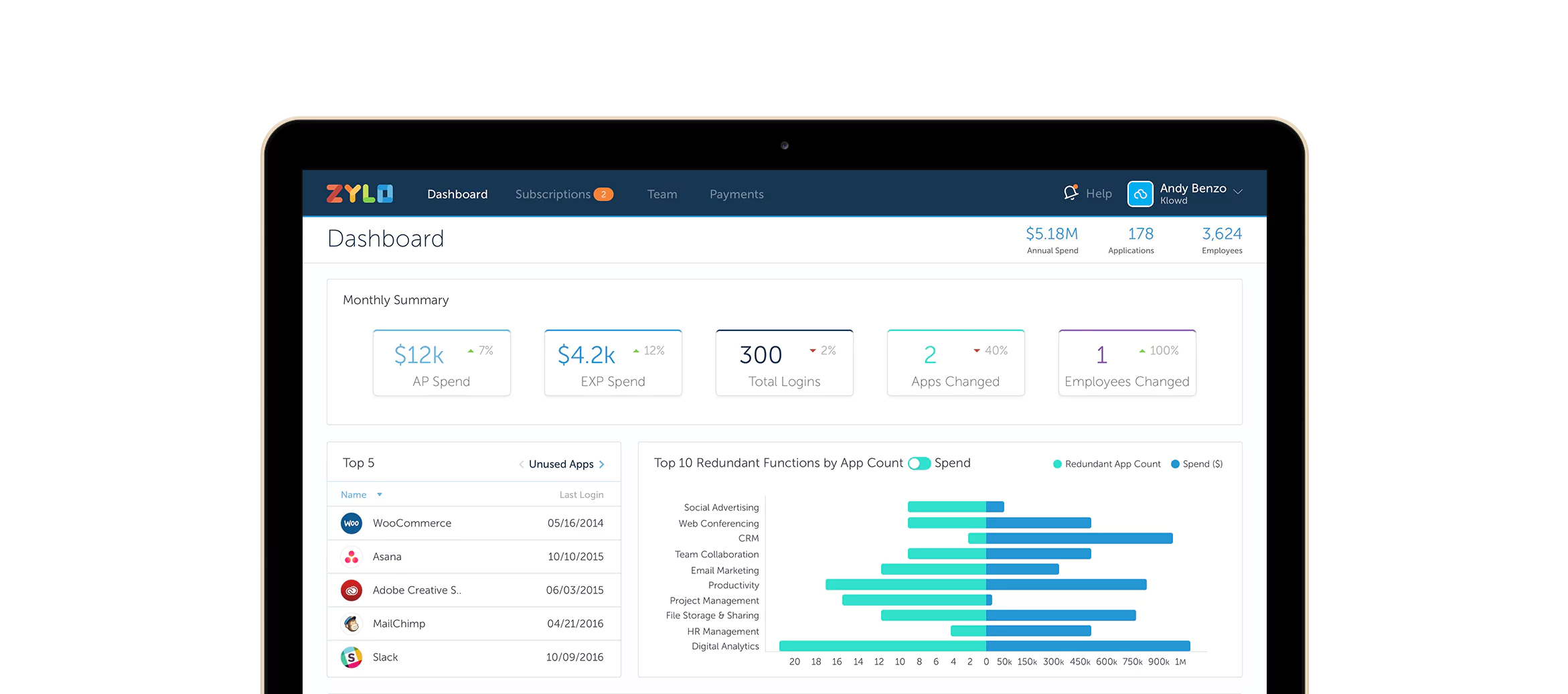
What Is FinOps Cloud Cost Management? (+ Framework and Tools)
Table of Contents ToggleGoing Beyond SaaS Application Visibility Drives Actionable DataActive...
Back
Back
Search for Keywords...
Blog

Table of Contents
At Zylo, we discover the SaaS applications in the enterprise and provide a SaaS management platform as one system of record to track SaaS application spend, utilization and employee feedback. The full view of this information, categorized in one system, is invaluable and means: no more spreadsheets, no more surprise auto-renewals, no more Shadow-IT, and the list goes on and on.
But how to you know you’re driving outcomes and making the most of your technology investments? It starts with measuring the value of your SaaS.
Visibility of SaaS spend in a SaaS Management platform is instantly valuable for IT Procurement teams. For Enterprise IT organizations, though, we’ve found they derive the most value from the deeper utilization information about their most strategic SaaS applications. Looking at active utilization by user and getting employee feedback about each SaaS application provides actionable data that IT and IT Procurement can both use to impact employee productivity, employee satisfaction, and ultimately, the bottom line.
Knowing how many licenses were purchased and how many licenses are provisioned is important information, but it doesn’t tell the full story about how valuable each application is to the users. Looking at active usage of each license paints a more valuable picture and gives you data to make decisions about your SaaS license optimization in real-time.
Knowing what the typical usage frequency should be, for each SaaS application, is information known at the time of purchase. In the average organization, 40% of applications are left unused or underutilized. Being able to run routine reports to analyze utilization activity allows you to identify low-utilization and put a plan in place around it. Aim for a 90% utilization rate.
After a SaaS application is purchased, it is often hard to figure out if the users find value in it. Surveying users on a periodic basis is a good practice to begin in order to monitor satisfaction over time and correlate SaaS application usage and spend with SaaS application satisfaction.
Once utilization reports and dashboards exist, it’s a best practice to put a plan in place around SaaS license optimization. Taking back unused licenses to provision to new users is a common strategy. Working with the business to determine what works best will be paramount to your success.
If there is low utilization for the SaaS applications employees should be using to do their job, setting up a training session for the non-active users is recommended. In the training, ensure employees know how to use the SaaS application and the importance of why it matters to use it.
Getting to this level of sophistication in measuring the value of your SaaS applications sounds difficult. But with a SaaS optimization platform, it is an achievable outcome in a just a few short weeks. As more and more software purchases are continuing to be made outside of IT, and the majority of new purchases are SaaS applications, ensuring IT and IT Procurement have a centralized management and optimization platform is critical (for the budget, for security and for everyone’s sanity!).

Table of Contents ToggleGoing Beyond SaaS Application Visibility Drives Actionable DataActive...

Table of Contents ToggleGoing Beyond SaaS Application Visibility Drives Actionable DataActive...

Table of Contents ToggleGoing Beyond SaaS Application Visibility Drives Actionable DataActive...

Table of Contents ToggleGoing Beyond SaaS Application Visibility Drives Actionable DataActive...
| Cookie | Duration | Description |
|---|---|---|
| cookielawinfo-checkbox-analytics | 11 months | This cookie is set by GDPR Cookie Consent plugin. The cookie is used to store the user consent for the cookies in the category "Analytics". |
| cookielawinfo-checkbox-functional | 11 months | The cookie is set by GDPR cookie consent to record the user consent for the cookies in the category "Functional". |
| cookielawinfo-checkbox-necessary | 11 months | This cookie is set by GDPR Cookie Consent plugin. The cookies is used to store the user consent for the cookies in the category "Necessary". |
| cookielawinfo-checkbox-others | 11 months | This cookie is set by GDPR Cookie Consent plugin. The cookie is used to store the user consent for the cookies in the category "Other. |
| cookielawinfo-checkbox-performance | 11 months | This cookie is set by GDPR Cookie Consent plugin. The cookie is used to store the user consent for the cookies in the category "Performance". |
| viewed_cookie_policy | 11 months | The cookie is set by the GDPR Cookie Consent plugin and is used to store whether or not user has consented to the use of cookies. It does not store any personal data. |